The Coastside has a history of shuttle “buses”. This one shuttled passengers from San Gregorio, Pescadero and Swanton to Santa Cruz and back. Note the conductor sitting on his perch.
I wonder if our new shuttle be as colorful.
Photo: Randolph Brandt
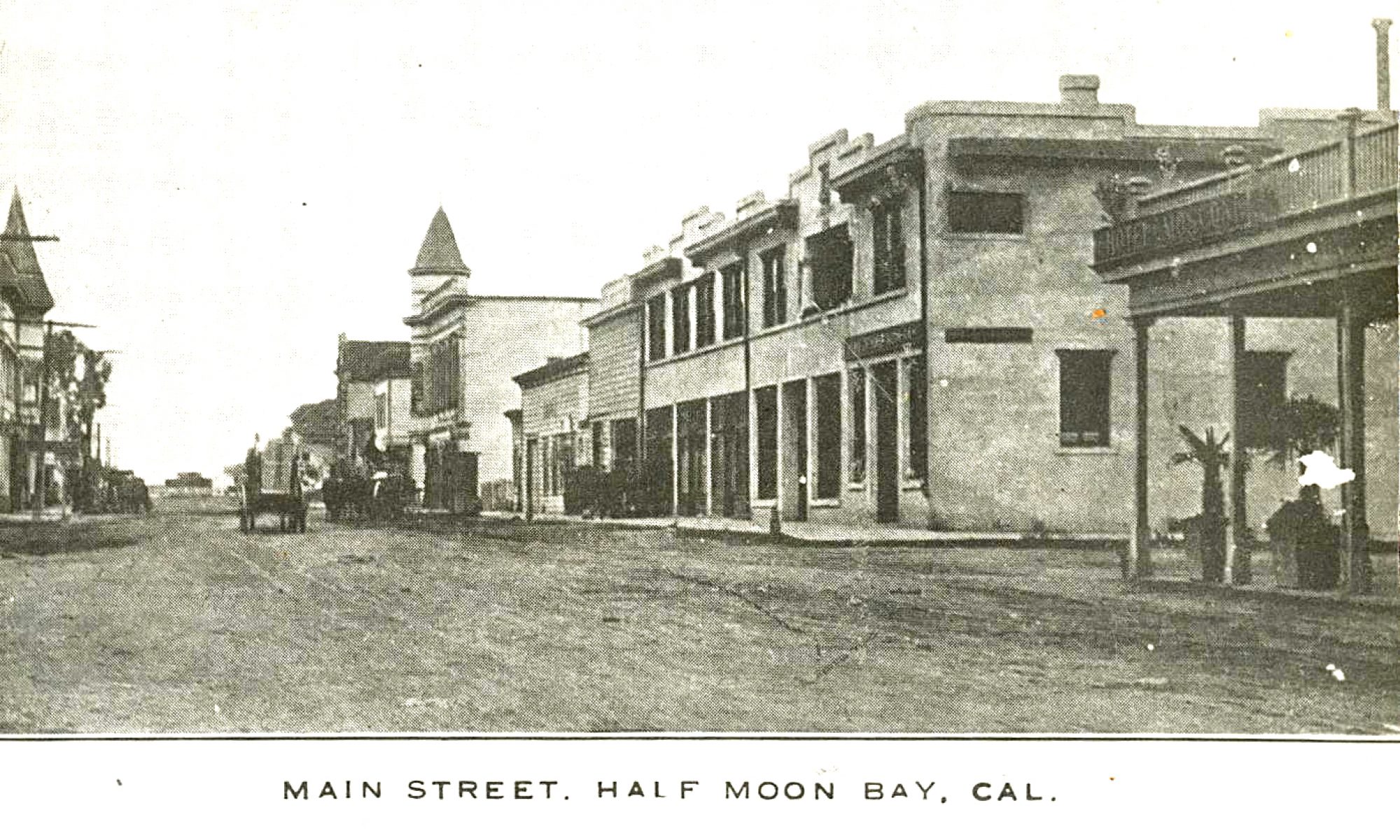
Created by June Morrall

Ed Bauer moved to Half Moon Bay in 1960 where he became the publisher and editor of the Half Moon Bay Review for about 25 years.
(In 1980 I interviewed him for my documentary, âThe Mystery of Half Moon Bayâ?. Here are some quotes that did not air).
On Growth:
âThe community was essentially rural [when Ed arrived in 1960]. A rural community with an emphasis on agriculture. And it was just beginning to change from an agricultural area to a commuter or suburban area.
âWhen I came here they were building 9-10 houses a year on the whole Coastsideâthat would be from San Gregorio into Montara.
âAnd the cost of lots in Montara was from $300 to $400 which was less than the sewer assessment for the lot. So it was still pretty muchâ¦Iâd describe it s a rural area in transitionâ¦.
â…In the 1960s I made a statement that I didnât want to see Half Moon Bay become another Pacifica. We wanted balanced growth. We didnât want to see ultra-high density population and rows and rows f houses with no open space.
âWhat we were looking for was balanced growth. Thereâs enough area over here for a balance in the growth.
âI think this is what the City of Half Moon Bay has been attempting to accomplishâof having a balance between open space and housing.
âOne of our biggest concerns was the people of San Franciscoâwe could see them pouring into Pacifica which had this ultra-high population density. And, with this came problems in schools, crime, and traffic, public activities and taxes.
âYou get whatâs called a âbedroom communityâ which has an economic imbalance.
âWe want to have some agriculture. We wanted to have some fishing. We wanted to have jobs for people who live hereâ¦â?
On the Coastal Commission
âParts of coastal communities in California are exempt from the Coastal Commision: L.A., Santa Cruz, San Francisco, exempt. By political pressure they were able to get special concessions because they have more political muscle.
âThe Coastal Commission is one law for one group, another law for another group.
âHalf Moon Bay, because of the lack of political muscle, couldnât stand up to the Coastal Commission the way other cities could on the coast.
âFrenchmanâs Creek is a typical example. Quite a few homes were bought by people who lived in the area, then they made a return on their houses at Frenchmanâs Creek. Some of
the very same people have gone to the Golf Links.
ââ¦I donât think Montara Mountain is going to be packed with house side-byside. I think even if the Coastal Commission hadnât been in effect, there are certain pressures operating, just like they operated against the Ocean Shore Railroad.â?
Half Bay Memories & the El Granada Observer has commissioned an unofficial survey of the number of big commercial trucks and big rigs traveling to and fro on Highway 92.
And the numbers from this unofficial âeye countâ? are in.
âApproximately every sixth vehicle,â? according to the ‘eye count’ survey, âis either a large commercial vehicle or big rig sandwiched in between commuter and passenger cars and smaller working trucks traveling to and from the Coastside during daylight hours on the weekdays.â?
Well, there you have it. Every sixth vehicle is a large truck or big rig.
Are they all going to Devilâs Slide, to help fix the broken road?
Are they going to the dump?
Where are they going?
Should they be on the road during daylight hours while Devilâs Slide is closed, making life miserable for commuters and almost impossible for those who would come to shop and visit the Coastside?
In 1913 a âSee America Firstâ? travel campaign captured the imagination of new car owners, and hot on the trail of the trend, the California-based editors of âMotoringâ? magazine recommended that readers âsee Half Moon Bay firstâ?.
What they called the âKings Mountain to Half Moon Bayâ? tour caught on quickly. âMotoringâ? advised âcamera fiendsâ? to brings rolls of film to capture âthe picture primeval and beautiful, as it is restless and wild.â?
Clutching the steering wheel of the latest model Kissel Kar, the driver and his party of motor enthusiasts sampled the much talked about 1-day tour from Kings Mountain to Half Moon Bay.
For the jaunty motorists in the Kissel Kar, the Kings Mountain âroadâ? resembled not a rocky brown trail but rather verses from an 18th century poem: âa long green lane canopied overhead with interlacing boughs.â?
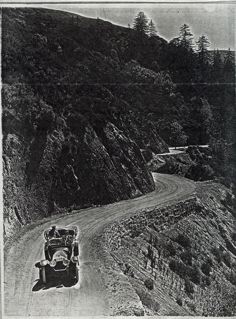
Traveling west over Tunitas Creek Road, they paused to contemplate an abandoned sawmill, overgrown with ferns. The Kissel Kar passed through the shadow-filled canyons bordered with vibrant green ferns and Redwood trees. The canyons opened up as the Pacific Ocean and the rolling hills came into view. The air felt cooler and the color of the landscape changed from green to earthy brown tones.
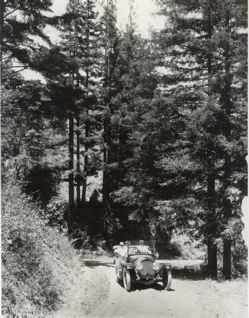
The new Kissel Kar swung north toward Half Moon Bayâthen better known as âSpanishtownâ?. The townâs mood was sleepy, compared with the wheeling and dealing that had dominated the area during the Ocean Shore Railroad real estate boom.
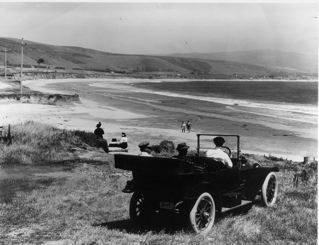
But when the automobile continued heading north to enjoy the spectacular views from Pedro Mountain Road near Montaraâthe editors of âMotoringâ? magazine discouraged readers from following in their tire tracks.
âEven with a thoroughly reliable driver and trustworthy car,â? advised the magazine, âPedro Mountain road is in such poor condition that anyone going this way is simply inviting disaster.â?
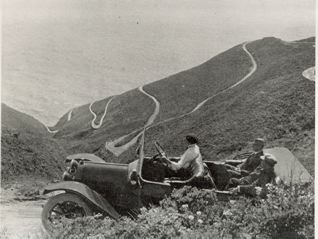
Underscoring the danger was a large sign that read: âDANGEROUS FOR AUTOMOBILESâTAKE ROAD VIA SAN MATEOâ?
If they chose to ignore this sign, motorists encountered grades as steep as 25 percent in some places. The hairpin turns called for âthe coolest heads, firmest hands and strongest brakes that a car can have.â?
But while the driver and his passengers in the Kissel Kar warned others not to drive Pedro Mountain Road, they took the risksâand as a result, we can enjoy the photographs they took more than 90 years ago.
Hello June,
Thanks for running the SF Examiner piece on the shuttle bus.
I used to read the Examiner regularly but these days the only place I can get reliable information about Devil’s Slide is online, mostly from you.
Maybe I’m a bit dim but I don’t understand what this shuttle is supposed to do.
Does it run just north and south, on highway 1? I thought we already had buses that do that (the ones I see are always empty).
One thing’s for sure. May the Good Lord protect us from any organization that’s called the Peninsula Traffic Congestion Relief Alliance. It’s bound to cause more trouble than any good.
And who, in heaven’s name, ever heard of the Parking Company of America? Just what we needed– another entity sucking up taxpayer money.
Well, I hope these shuttles are well marked so at least we’ll know who these folks are that are making traffic even worse.
Why didn’t they just take the $160,000 and apply it to fixing the Slide? Maybe that would help get Devil’s Slide open an hour sooner.
Montara Bob
So the politicians have a “solution” to the Devil’s Slide Crisis:
an expensive government shuttle, with the dough going to
the Parking Company of America (how appropriate).
It will enable Coastsiders to sit in a dirty
bus for hours, and then drop you off in inconvenient locations
on the Coastside and elsewhere, so you can take more
socialist buses.Talk about time-wasting, money-wasting baloney.
Let’s put the bureaucrats and politicians on the bus permanently,
and Open Devil’s Slide, Now.
Lew From Far Away
I don’t understand this story: tell me more about the shuttle. Is it crossing Devil’s Slide? Will we be able to see what construction crews are doing? Can we keep our cars on the Pacifica side and get a free ride over the Slide to Half Moon Bay? What will the shuttle look like? Air conditioned for those hot summer days? Who are the drivers? Will you be hiring local drivers?
(From S.F. Examiner, June 16, 2006)
“County plans shuttle to, from coastside
July-September route meant to alleviate closure issues
Relief by way of shuttle is coming to San Mateo County coastal residents burdened by ongoing traffic snarls caused by the closure of state Highway 1 in April.
San Mateo County officials approved the use of $160,000 in emergency funds to help develop an emergency shuttle service for coastal residents.
State Highway 1 between Pacifica and Montara was closed April 2, after heavy rains caused a landslide that compromised the thoroughfare.
‘This shuttle service will enable commuters and students to travel to and from the coastside comunities that are both north and south of the Devil’s Slide closure,’ Pacifica Councilman Jim Vreeland said in a statement.
Parking Company of America will provide the shuttle service, and the Peninsula Traffic Congestion Relief Alliance and SamTrans will develop the shuttle route and schedule, whic is expected to begin in July.
‘While the shuttle service won’t alleviate much of the travel time needed for their commute, it will take some cars off the road and allow these residents to sit back and relax,’ Half Moon Bay Vice Mayor Naomi Patridge said.
Funding for the shuttle service will be provided through September, at which time the closed section of the highway is expected to open.
For more information on the emergency shuttle service, contact Christine Maley-Grubi of the Peninsula Traffic Congestion Relief Alliance at (650) 588-8170.”